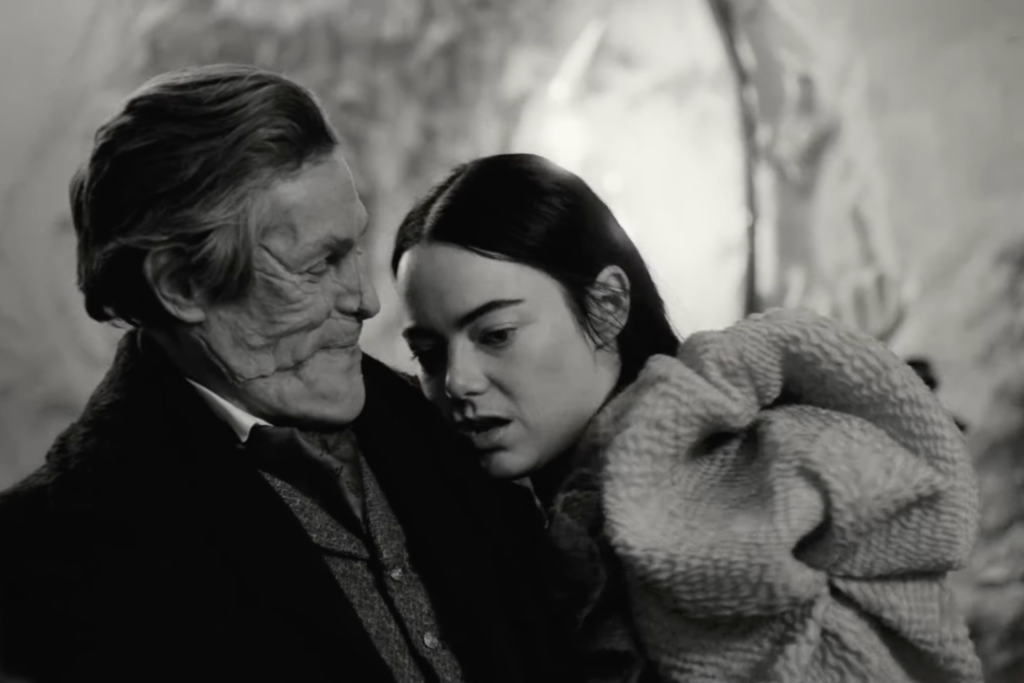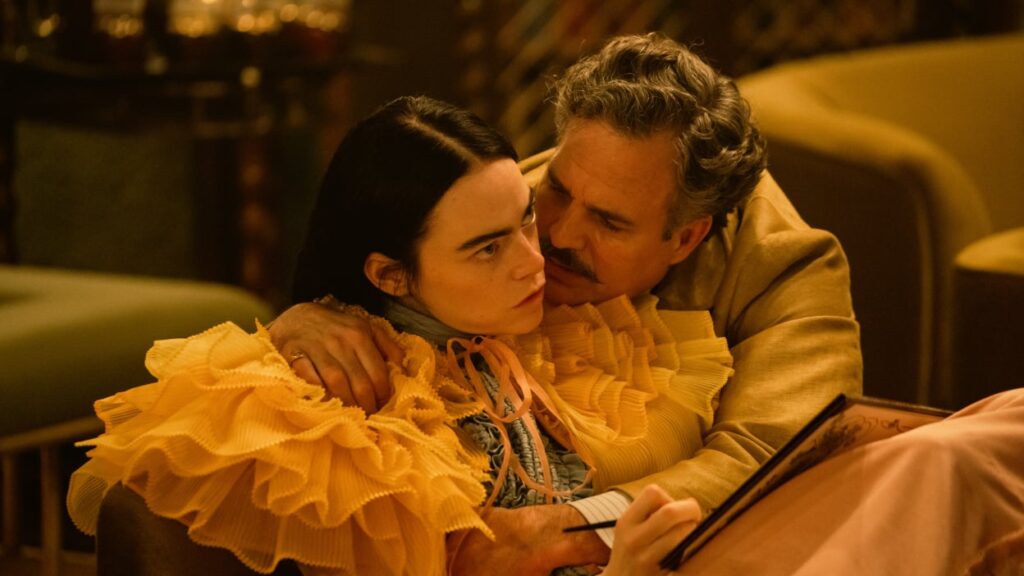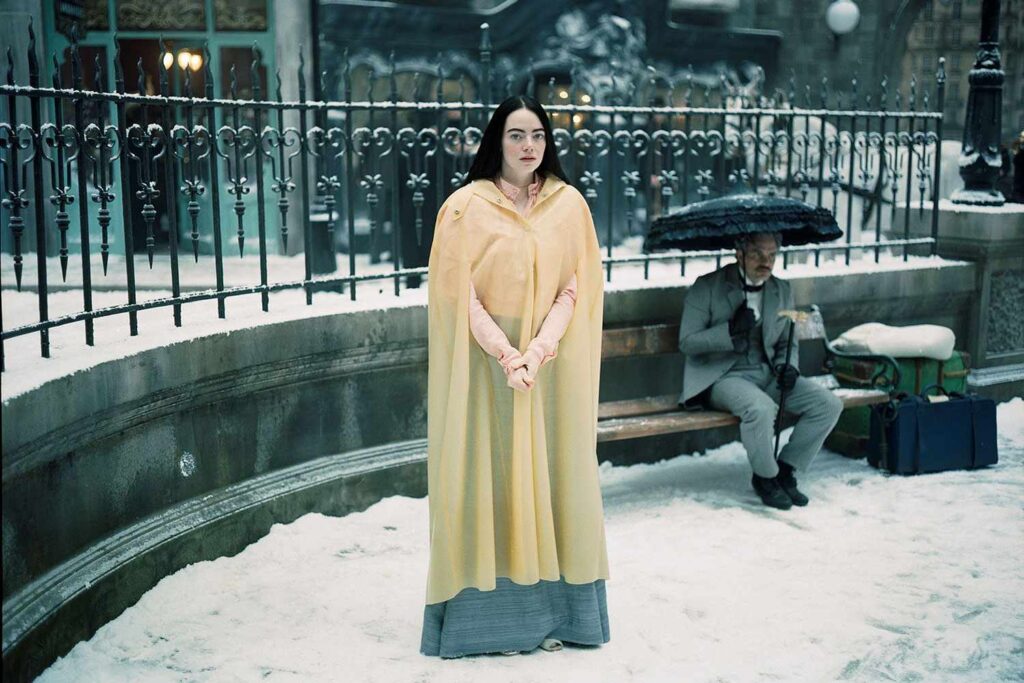This year’s prize for movie audacity goes to Poor Things, Yorgos Lanthimos’ fiercely realized, exuberantly funny liberation odyssey starring Emma Stone in a career-high performance as an instantly iconic screen character, one created as a companion for man but whose appetite for self-discovery challenges period conventions and, perhaps, modern movie sensibilities. In one of the year’s best films (and one poised to be a cult sensation), both director and actor reach a collaborative creative apex.
Adapted by screenwriter Tony McNamara from Alasdair Gray’s 1992 romp of a novel about a deceased Victorian woman resurrected before embarking on a quest for independence, the Greek-born Lanthimos (The Lobster, The Killing of a Sacred Deer, The Favourite) delivers an ingenious postmodern Pygmalion by way of gender subverted Mary Shelley parable, a feminist Frankenstein informed by a streak of gothic Victorian design and mores. His monster—a ribald young woman who sets about rejecting the constraints of “polite society” in search of personal fulfillment—affords Stone the best role of her career, which in a perfect world would net the actress a second, deserved Oscar.
An absurdist marriage of style and tone rendered as a very fractured (and very adult) fairly tale, Poor Things finds Lanthimos—the ever misanthropic pessimist whose blackly comic films frequently peer into the darkest recesses of human nature—working in a less sardonic, more spritely key, preposterous as ever yet appealingly human. In the filmmaker’s second outing with Stone (after The Favourite and reported to be followed by another feature or two), the actress eschews all inhibitions to deliver a full bodied, richly comedic performance.

Her Bella Baxter, a formerly subjugated wife and suicide victim plucked from the Thames by celebrated London physician/part-time mad scientist Godwin Baxter (Willem Dafoe, under scarred make-up) and reanimated sans memory, a rapidly developing infant in a woman’s body primed to take on a brave new world, proves an elastic vessel for Stone’s signature tack-sharp wit and endearing extroversion. She fearlessly goes for it in a perfect amalgam of body and mind, actress and role.
Ingeniously designed by James Price and Shona Heath, who have constructed a strange, expressionistic sort of Twilight Zone by way of Tim Burton or Terry Gilliam storybook fantasy, Lanthimos opens his picture in a black and white London where we meet Dafoe’s “God” Baxter, who recruits his brightest medical student, Max McCandles (Ray Youssef), to assist with his dementedly daring experiment.
Once Stone is reborn as Bella Baxter, the actress, photographed during the opening set-up with a wide angle lens to provide maximum imbalance with fish-eye distortion, thrusts her Bella into existence through a zanily inspired collection of herky-jerky body contortions, an ill-mannered (wait until you see her table etiquette) and amusingly discordant mind and body of wobbling gait and flailing limbs; it’s a feat of physical performing.

While God denies Bella the outside world, the kept child-woman increasingly longs to leave the nest. Two potential solutions arrive, the first a conspicuous marriage proposal from McCandles designed to keep her under God’s permanent supervision, and the second an offer from wily, libertine attorney Duncan Wedderborn, played with gonzo panache by a game Mark Ruffalo, who quickly sizes up Bella’s adventurous sexual potential, intending to deflower her on a European ports-of-call holiday. The wrinkle is that Bella has already discovered the joys of sex—with herself—and her masturbatory carnal delights have no intention of being properly tethered.
Spirited to Lisbon, Bella experiences male-female sex for the first time, which she will coin as “furious jumping,” and learns a thing or two about masculine dominance, which she quickly rejects given her emerging identity as a self-pleasuring hedonist reveling in the joys of cuisine, music, dancing (Stone’s moves are a real kick) and socialization. This independence will reach full flower after Bella cheerfully joins a Parisian bordello whose madame, played by the sublime Kathryn Hunter (The Tragedy of Macbeth), relishes her bright new star’s predilection for passion.
Bella’s sexual evolution across a series of comic encounters with paying patrons will both satisfy her libido and provide her a robust sexual education, each new chapter of carnal knowledge affording insights about men, herself and the world. These passages are bracingly funny, matter-of-fact and non-gratuitous, explicit yet neither sexy nor titillating, eschewing audience arousal in favor of Bella’s emerging consciousness, played by Stone with exhilarating abandon.

The Oscar-winning actress is the engine driving this mad, dazzlingly designed and gleefully debauched voyage, and it’s a joy to see her plunge into such an entertaining character, a would-be liberated Jane Austen-esque heroine by way of modern patriarchal put-down. Her Bella rejects alpha male ego dominance in all forms, right up to the picture’s blackly comic final moments, savagely course correcting potential enslavement by suggesting what radical maneuvers might be required for an independent woman of Bella’s time to come into her own.
In what will likely become her signature screen character, Stone reaches a level of physical and cognitive sophistication no other actor this year can touch, believably evolving from newborn naïveté to sexual iconoclast to emerging free thinker. Yet as dominant as the star may be, the ensemble nearly matches her commitment, Dafoe imbuing his mad doctor with genuine pathos, Ruffalo a fab comic foil, Youssef endearing as a properly progressive potential husband and Hunter, her lithe, diminutive body covered in tattoos, oddly maternal. Late in the film, Christopher Abbot shows up in a scalding performance integral to the pointed denouement.
Lanthimos has a ball directing Stone to Bella’s guileless mindset, that of a child’s rapidly developing awareness driving the body of a nonconforming woman, one taking in pleasure without shame while barely able to form coherent thoughts, speaking but with rudimentary elocution. And he’s crafted a picture that is perhaps the best looking this year, a joyous mash-up of Burton and Terry Gilliam in its cartoonishly skewed, reality heightened artist’s renderings of Lisbon, Paris, Alexandria and London, designed and costumed (courtesy of the Holly Waddigton’s inspired, near sci-fi creations) as a frame-by-frame fantasia of visual invention.
While Bella may have been resurrected as a dubiously perverse experiment, who are the literal monsters in a world that wishes to oppress and enslave her? In making a resolutely fun and entertaining movie about sexuality, independence, power and society, Lanthimos and Stone deliver one of the year’s best films.
4 stars



